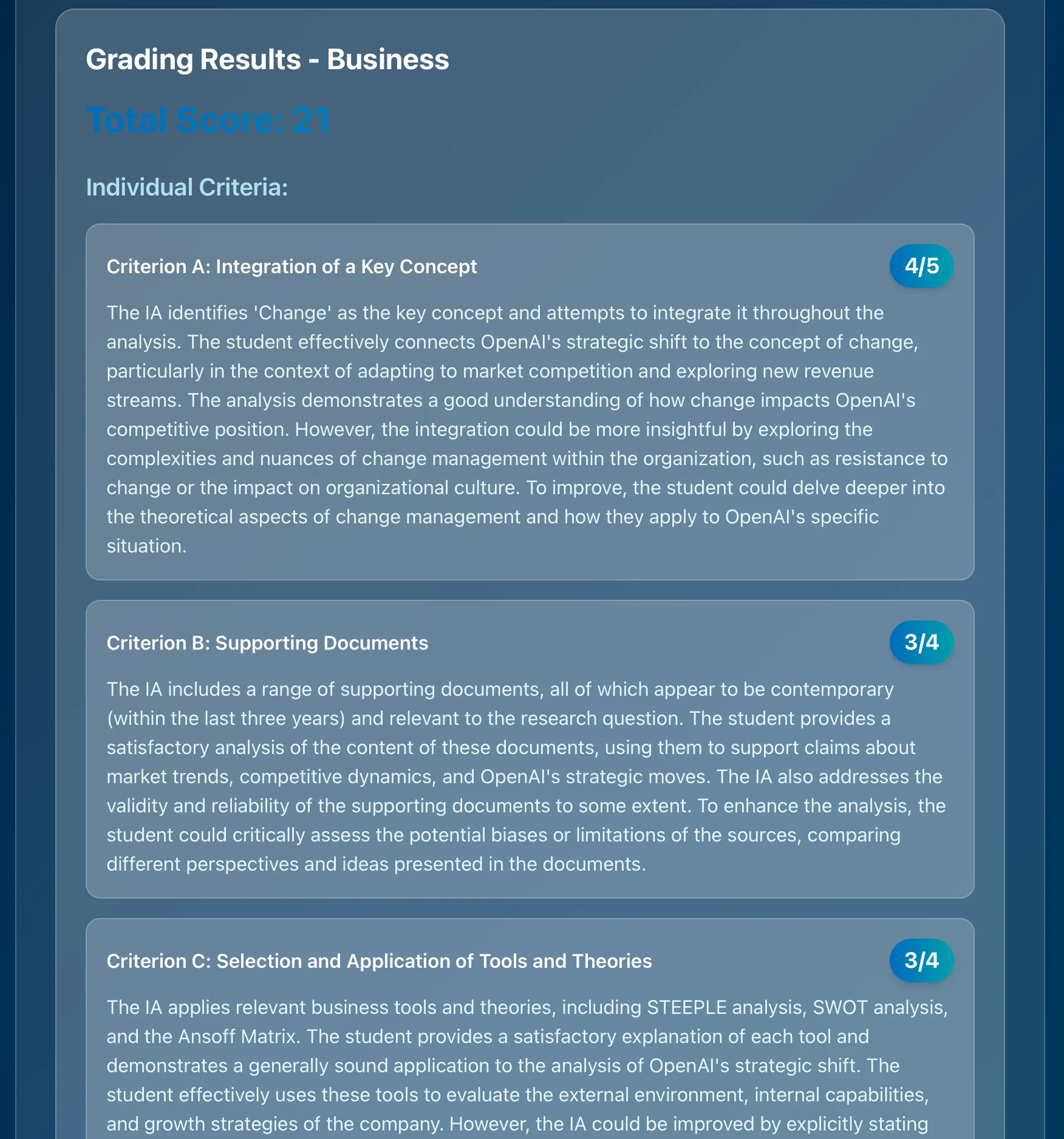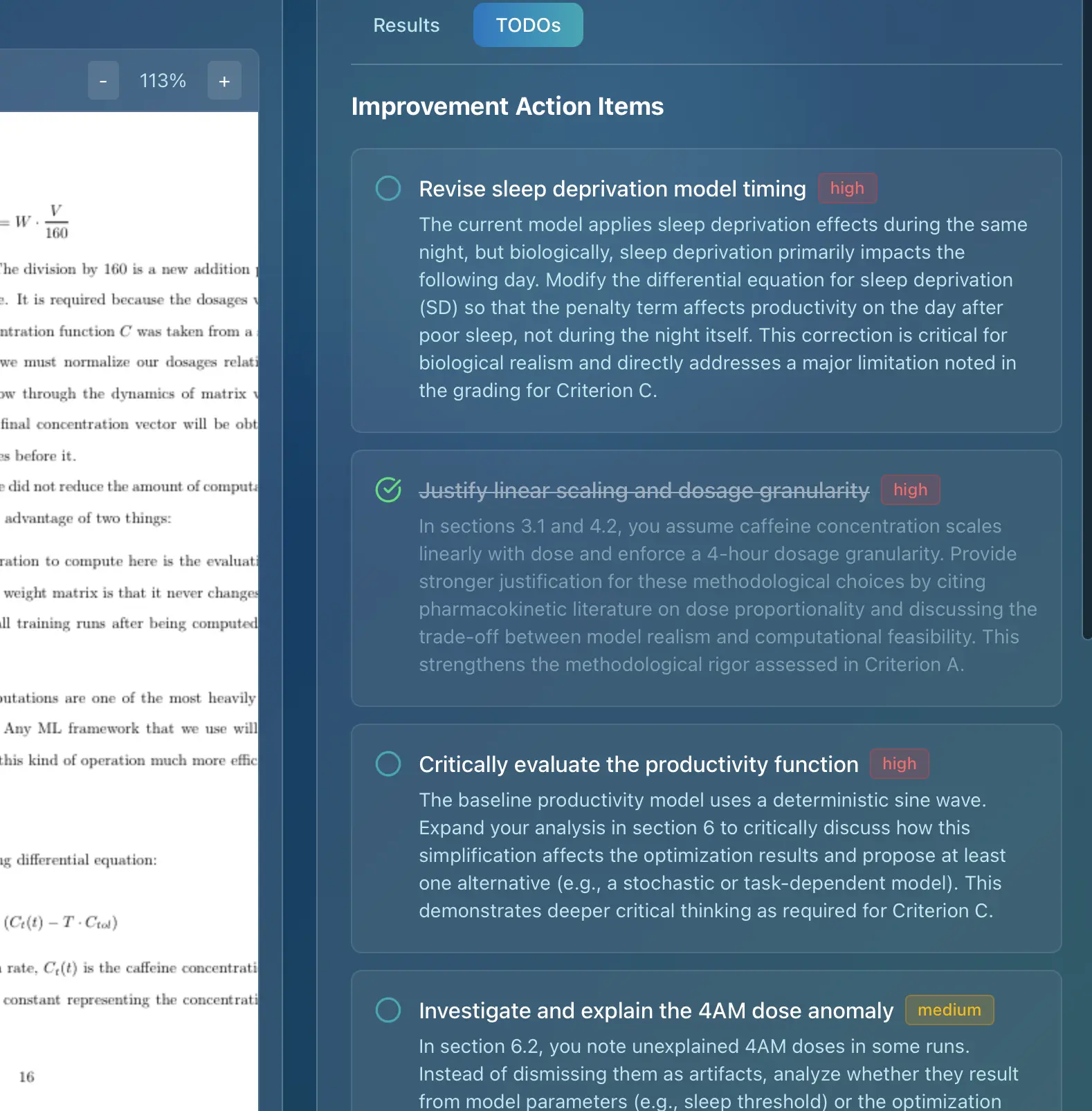IB Global Politics IA: A Guide to Engagement Activities
Are you tackling the IB Global Politics Internal Assessment (IA) and feeling overwhelmed by the engagement activities component? This guide is designed to provide you with a clear understanding of what's expected, how to choose effective activities, and how to maximize your marks. We'll break down the assessment criteria, offer practical tips, and even explore how AI tools can help you refine your work. By the end of this guide, you'll have a solid foundation for crafting a compelling and high-scoring Global Politics IA. Let's dive in and demystify the process!
Understanding the IB Global Politics IA and Engagement Activities
The IB Global Politics IA is a crucial component of your overall IB grade. It requires you to engage with a specific political issue, conduct research, and present your findings in a structured report. A key element of the IA is the "engagement activity," which involves actively interacting with the political issue you've chosen. These activities are not just about passively researching; they're about actively participating and gaining firsthand insights.
The IA is assessed based on several criteria, including:
- Explanation and Justification (Criterion A): How well you explain the political issue, its importance, and the relevance of your engagement activities.
- Process (Criterion B): How well-organized and planned your research process is, demonstrating engagement with the political issue.
- Analysis and Synthesis (Criterion C): How critically you analyze the political issue, demonstrating a strong understanding of course material and synthesizing different perspectives.
- Evaluation and Reflection (Criterion D): How critically you reflect on your research and engagement process, demonstrating self-awareness and evaluating the effectiveness of your activities.
- Communication (Criterion E): How clearly and effectively you communicate your findings and ideas in the report.
- Recommendation (Criterion F - HL Only): How thoughtful and practical your recommendation is, considering potential implications and challenges (HL students only).
Struggling with IB Assessments?
Get instant, detailed feedback on your work with AI that understands IB criteria.

Choosing the Right Political Issue for Your IA
Selecting the right political issue is the first crucial step. It should be:
- Relevant: Directly related to the Global Politics course content.
- Specific: Narrow enough to allow for in-depth analysis.
- Engaging: Something you're genuinely interested in, as this will make the research process more enjoyable and productive.
- Feasible: You need to be able to conduct meaningful engagement activities related to the issue.
Examples of Political Issues:
- The impact of social media on political polarization in a specific country.
- The effectiveness of international sanctions on a particular regime.
- The role of NGOs in addressing a specific humanitarian crisis.
- The influence of lobbying groups on environmental policy in a specific region.
Brainstorming Effective Engagement Activities
Once you've chosen your political issue, it's time to brainstorm engagement activities. These activities should allow you to:
- Gather firsthand information: Go beyond textbooks and academic articles.
- Engage with different perspectives: Talk to people with varying viewpoints on the issue.
- Gain a deeper understanding: Experience the issue in a practical way.
Types of Engagement Activities:
- Interviews: Conduct interviews with experts, policymakers, activists, or individuals directly affected by the issue.
- Surveys: Design and administer surveys to gather data on public opinion or attitudes related to the issue.
- Observations: Attend public events, meetings, or protests related to the issue and document your observations.
- Participation: Volunteer with an organization working on the issue or participate in a relevant campaign.
- Document Analysis: Analyze primary source documents, such as policy papers, speeches, or media reports.
- Simulations: Participate in or create a simulation to explore the dynamics of the political issue.
Example:
Let's say your political issue is "The impact of social media on political polarization in the United States." Here are some potential engagement activities:
- Interview: Interview a political science professor specializing in social media and politics.
- Survey: Conduct a survey of college students to gauge their social media usage and political views.
- Observation: Observe online political discussions on platforms like Twitter or Facebook.
Structuring Your IA Report: Integrating Engagement Activities
Your IA report should clearly explain your engagement activities and how they contributed to your understanding of the political issue. Here's a suggested structure:
- Introduction: Introduce your political issue, explain its significance, and state your research question.
- Explanation and Justification (Criterion A): Clearly explain the political issue, justify its importance, and describe your engagement activities. Explain why these activities are relevant to understanding the issue.
- Process (Criterion B): Describe your research process, including the steps you took to plan and execute your engagement activities. Document the methods and sources you used.
- Analysis and Synthesis (Criterion C): Analyze the information you gathered through your engagement activities. Connect your findings to relevant course content and synthesize different perspectives.
- Evaluation and Reflection (Criterion D): Critically reflect on your research and engagement process. Discuss the strengths and limitations of your activities and how they enhanced your understanding of the political issue.
- Recommendation (Criterion F - HL Only): Offer a thoughtful and practical recommendation based on your research and engagement activities. Consider potential implications and challenges.
- Conclusion: Summarize your key findings and restate your thesis.
Example Integration:
In the "Analysis and Synthesis" section, you might write:
"The interview with Professor Smith provided valuable insights into the role of algorithms in shaping online political discourse. He explained how filter bubbles and echo chambers can reinforce existing biases and contribute to political polarization. This perspective, combined with the survey data indicating that students who primarily consume news from social media are more likely to hold extreme political views, suggests a strong correlation between social media usage and political polarization."
Pro Tip: Get AI-Powered Grading
Stop second-guessing your grades. Get instant feedback aligned with official IB rubrics.

Common Challenges and Mistakes in the Global Politics IA
Students often face several challenges when completing their Global Politics IA:
- Choosing an overly broad topic: This makes it difficult to conduct focused research and engagement activities.
- Solution: Narrow down your topic to a specific aspect of the political issue.
- Failing to justify the relevance of engagement activities: Students sometimes choose activities that are not directly related to their research question.
- Solution: Clearly explain how each activity contributes to your understanding of the political issue.
- Providing a descriptive rather than analytical report: The IA should be analytical, not just a summary of information.
- Solution: Focus on critically evaluating different perspectives and drawing your own conclusions based on the evidence.
- Lacking critical reflection: Students sometimes fail to critically evaluate their research and engagement process.
- Solution: Discuss the strengths and limitations of your activities and how they impacted your understanding of the issue.
- Poor time management: Starting the IA too late can lead to rushed work and lower marks.
- Solution: Create a timeline and stick to it. Break down the IA into smaller, manageable tasks.
Advanced Tips and Strategies for a High-Scoring IA
- Connect to Theory: Explicitly link your findings to relevant political theories and concepts. For example, if you're analyzing the role of NGOs, connect your analysis to theories of international relations or development.
- Consider Multiple Perspectives: Actively seek out and engage with diverse viewpoints on the political issue. This will demonstrate critical thinking and a nuanced understanding.
- Use Primary Sources: Incorporate primary source materials, such as policy documents, speeches, or interviews, to add depth and credibility to your analysis.
- Be Ethical: Ensure that your research and engagement activities are conducted ethically. Obtain informed consent from interviewees and properly cite all sources.
- Seek Feedback: Ask your teacher or a peer to review your IA draft and provide feedback.
Technology and Modern Assessment: Leveraging AI for Success
The landscape of education is constantly evolving, and technology plays an increasingly important role in assessment. AI-powered tools are emerging as valuable resources for both students and teachers in the IB program.
For students, AI can help with research, analysis, and writing. For example, AI-powered search engines can quickly identify relevant sources, while AI writing assistants can help improve clarity and grammar.
For teachers, AI can streamline the grading process and provide more detailed feedback to students. This is where Marksy comes in. Marksy is an AI grading assistant specifically designed for the International Baccalaureate. It provides instant, accurate, and detailed feedback on student work based on official IB rubrics.
How Marksy Can Help:
- Rubric-Aligned Scoring: Marksy uses the official IB Global Politics IA rubric to score student work, ensuring consistency and accuracy.
- Detailed Criterion-by-Criterion Feedback: Marksy provides specific feedback for each assessment criterion, helping students understand their strengths and weaknesses.
- Suggestions for Improvement: Marksy offers actionable suggestions for how students can improve their work and achieve higher marks.
- Time-Saving Benefits for Teachers: Marksy automates the grading process, freeing up teachers' time to focus on other important tasks.
By leveraging AI tools like Marksy, teachers can provide more consistent, detailed, and personalized feedback to students, ultimately helping them achieve their full potential in the IB program. The use of AI ensures that feedback is aligned with official IB criteria, promoting fairness and accuracy in assessment.
Conclusion: Take Action and Maximize Your IA Score
The IB Global Politics IA is a challenging but rewarding task. By understanding the assessment criteria, choosing effective engagement activities, and critically analyzing your findings, you can craft a high-scoring report that demonstrates your understanding of global politics. Remember to reflect on your learning process and seek feedback from your teacher or peers.
Ready to take your IB Global Politics IA to the next level? Try Marksy for free today and experience the power of AI-driven feedback! See how Marksy can help you understand the IB rubric, identify areas for improvement, and ultimately achieve a better score. Start your free trial now and unlock your full potential!